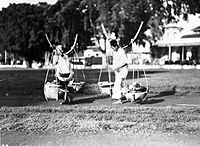- Madurese people
-
Madurese
Orèng Madura (Madurese)
Orang Madura (Indonesian)
Wong Madura (Javanese)
Madurese food seller in East Java during colonial period. Total population 6.8 million (2000 census)[1] Regions with significant populations East Java 6,281,000 Central Kalimantan 62,000 Languages Religion Predominantly Muslim
Related ethnic groups Javanese, Malay
The Madurese also known as Orang Madura and Suku Madura are an ethnic group originally from the island of Madura but now found in many parts of Indonesia, where they are the third-largest ethnic group by population. Common features of most Madurese throughout the archipelago include Islamic religion and the use of the Madurese language.
The Madurese are a religious ethnic, mostly joint with Nahdlatul Ulama, a moderate Muslim organization in Indonesia. Pesantren has a pivotal role in Madurese life.
While the Madurese have roots on Madura, off the northeastern coast of Java, the majority of Madurese do not now live on that island. The Madurese people have migrated out of Madura over several hundred years, mostly driven by poor agricultural resources in their home island. The majority have settled on Java, where an estimated six million Madurese live, especially in East Java where they form about half the population.
Contents
Transmigration
The Madurese were also major clients of the government transmigration programs of the nineteenth and twentieth centuries, through which they settled in relatively sparsely populated areas of Indonesia's other islands, especially Kalimantan. As a result of this program, many regions of Indonesia have communities of former transmigrants and their descendants that maintain their Madurese identity. Some of these migrant groups have been the subject of conflict with Dayak communities. The best-publicicized conflict has been on Kalimantan, where thousands were killed in fighting between the Madurese and the Dayak people during the late 1990s.
Social life
Family is important to the Madurese and they commonly live in villages that function around an Islamic religious center. According to Islamic law, a man may have more than one wife. Marriage proposals are usually made by the groom's parents, preferably to a first or second cousin. If the proposal is accepted, the bride's parents are then presented with the "bride price", which is usually cattle. The groom's parents then set the date for the upcoming wedding. Newlywed couples often live with the bride's family.
Because the island of Madura has very poor soil, farming is not important in Madurese culture. As a result, the Madurese tend not to farm on other islands with very good soil, such as Java, and opt to herd cattle, fish, or sail instead. A common nickname for the Madurese is "cowboys" of Indonesia. Cattle are an important part of the culture, and bull-racing is one of their favorite sports. Islam is an integral part of the social, political and economic life of the Madurese.
References
Further reading
- Farjon, I.(1980) Madura and surrounding islands : an annotated bibliography, 1860-1942 The Hague: M. Nijhoff. Bibliographical series (Koninklijk Instituut voor Taal-, Land- en Volkenkunde (Netherlands)) ; 9.
Categories:- Ethnic groups in Indonesia
- Muslim communities
- East Java
- Madura Island
Wikimedia Foundation. 2010.

